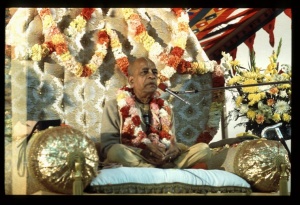CC Madhya 9.282: Difference between revisions
m (1 revision(s)) |
(Vanibot #0054 edit - transform synonyms into clickable links, which search similar occurrences) |
||
| (One intermediate revision by one other user not shown) | |||
| Line 1: | Line 1: | ||
{{ | [[Category:Sri Caitanya-caritamrta - Madhya-lila Chapter 09|C282]] | ||
<div style="float:left">'''[[Sri Caitanya-caritamrta|Śrī Caitanya-caritāmṛta]] - [[CC Madhya|Madhya-līlā]] - [[CC Madhya 9|Chapter 9: Lord Śrī Caitanya Mahāprabhu's Travels to the Holy Places]]'''</div> | |||
<div style="float:right">[[File:Go-previous.png|link=CC Madhya 9.281|Madhya-līlā 9.281]] '''[[CC Madhya 9.281|Madhya-līlā 9.281]] - [[CC Madhya 9.283|Madhya-līlā 9.283]]''' [[File:Go-next.png|link=CC Madhya 9.283|Madhya-līlā 9.283]]</div> | |||
{{CompareVersions|CC|Madhya 9.282|CC 1975|CC 1996}} | |||
{{RandomImage}} | |||
==== TEXT 282 ==== | ==== TEXT 282 ==== | ||
<div | <div class="verse"> | ||
tathā haite pāṇḍarapure āilā gauracandra | :tathā haite pāṇḍarapure āilā gauracandra | ||
viṭhṭhala-ṭhākura dekhi’ pāilā ānanda | :viṭhṭhala-ṭhākura dekhi’ pāilā ānanda | ||
</div> | </div> | ||
| Line 12: | Line 16: | ||
==== SYNONYMS ==== | ==== SYNONYMS ==== | ||
<div | <div class="synonyms"> | ||
tathā | ''[//vanipedia.org/wiki/Special:VaniSearch?s=tathā&tab=syno_o&ds=1 tathā] [//vanipedia.org/wiki/Special:VaniSearch?s=haite&tab=syno_o&ds=1 haite]'' — from there; ''[//vanipedia.org/wiki/Special:VaniSearch?s=pāṇḍara&tab=syno_o&ds=1 pāṇḍara]-[//vanipedia.org/wiki/Special:VaniSearch?s=pure&tab=syno_o&ds=1 pure]'' — to Pāṇḍarapura; ''[//vanipedia.org/wiki/Special:VaniSearch?s=āilā&tab=syno_o&ds=1 āilā]'' — came; ''[//vanipedia.org/wiki/Special:VaniSearch?s=gauracandra&tab=syno_o&ds=1 gauracandra]'' — Lord Śrī Caitanya Mahāprabhu; ''[//vanipedia.org/wiki/Special:VaniSearch?s=viṭhṭhala&tab=syno_o&ds=1 viṭhṭhala]-[//vanipedia.org/wiki/Special:VaniSearch?s=ṭhākura&tab=syno_o&ds=1 ṭhākura]'' — the Deity known as Viṭhṭhala; ''[//vanipedia.org/wiki/Special:VaniSearch?s=dekhi’&tab=syno_o&ds=1 dekhi’]'' — seeing; ''[//vanipedia.org/wiki/Special:VaniSearch?s=pāilā&tab=syno_o&ds=1 pāilā]'' — got; ''[//vanipedia.org/wiki/Special:VaniSearch?s=ānanda&tab=syno_o&ds=1 ānanda]'' — great happiness. | ||
</div> | </div> | ||
| Line 19: | Line 23: | ||
==== TRANSLATION ==== | ==== TRANSLATION ==== | ||
<div | <div class="translation"> | ||
From there Śrī Caitanya Mahāprabhu went to Pāṇḍarapura, where He happily saw the temple of Viṭhṭhala Ṭhākura. | From there Śrī Caitanya Mahāprabhu went to Pāṇḍarapura, where He happily saw the temple of Viṭhṭhala Ṭhākura. | ||
</div> | </div> | ||
| Line 26: | Line 30: | ||
==== PURPORT ==== | ==== PURPORT ==== | ||
<div | <div class="purport"> | ||
The city of Pāṇḍarapura is situated on the river Bhīmā. It is said that Śrī Caitanya Mahāprabhu initiated Tukārāma when He visited Pāṇḍarapura, and thus Tukārāma became His disciple. Tukārāma Ācārya became very famous in the Maharashtra province, and he spread the saṅkīrtana movement all over the province. The saṅkīrtana party belonging to Tukārāma is still very popular in Bombay and throughout the province of Maharashtra. Tukārāma’s book is known as Abhaṅga. His saṅkīrtana party exactly resembles the Gauḍīya-Vaiṣṇava saṅkīrtana parties, for they chant the holy name of the Lord with mṛdaṅga and karatālas. | The city of Pāṇḍarapura is situated on the river Bhīmā. It is said that Śrī Caitanya Mahāprabhu initiated Tukārāma when He visited Pāṇḍarapura, and thus Tukārāma became His disciple. Tukārāma Ācārya became very famous in the Maharashtra province, and he spread the ''saṅkīrtana'' movement all over the province. The ''saṅkīrtana'' party belonging to Tukārāma is still very popular in Bombay and throughout the province of Maharashtra. Tukārāma’s book is known as ''Abhaṅga''. His ''saṅkīrtana'' party exactly resembles the Gauḍīya-Vaiṣṇava ''saṅkīrtana'' parties, for they chant the holy name of the Lord with ''mṛdaṅga'' and ''karatālas''. | ||
The Lord Viṭhṭhaladeva mentioned in this verse is a form of Lord Viṣṇu with two hands. He is Nārāyaṇa. | The Lord Viṭhṭhaladeva mentioned in this verse is a form of Lord Viṣṇu with two hands. He is Nārāyaṇa. | ||
</div> | </div> | ||
__NOTOC__ | |||
<div style="float:right; clear:both;">[[File:Go-previous.png|link=CC Madhya 9.281|Madhya-līlā 9.281]] '''[[CC Madhya 9.281|Madhya-līlā 9.281]] - [[CC Madhya 9.283|Madhya-līlā 9.283]]''' [[File:Go-next.png|link=CC Madhya 9.283|Madhya-līlā 9.283]]</div> | |||
__NOTOC__ | |||
__NOEDITSECTION__ | |||
Latest revision as of 00:07, 20 February 2024

A.C. Bhaktivedanta Swami Prabhupada
TEXT 282
- tathā haite pāṇḍarapure āilā gauracandra
- viṭhṭhala-ṭhākura dekhi’ pāilā ānanda
SYNONYMS
tathā haite — from there; pāṇḍara-pure — to Pāṇḍarapura; āilā — came; gauracandra — Lord Śrī Caitanya Mahāprabhu; viṭhṭhala-ṭhākura — the Deity known as Viṭhṭhala; dekhi’ — seeing; pāilā — got; ānanda — great happiness.
TRANSLATION
From there Śrī Caitanya Mahāprabhu went to Pāṇḍarapura, where He happily saw the temple of Viṭhṭhala Ṭhākura.
PURPORT
The city of Pāṇḍarapura is situated on the river Bhīmā. It is said that Śrī Caitanya Mahāprabhu initiated Tukārāma when He visited Pāṇḍarapura, and thus Tukārāma became His disciple. Tukārāma Ācārya became very famous in the Maharashtra province, and he spread the saṅkīrtana movement all over the province. The saṅkīrtana party belonging to Tukārāma is still very popular in Bombay and throughout the province of Maharashtra. Tukārāma’s book is known as Abhaṅga. His saṅkīrtana party exactly resembles the Gauḍīya-Vaiṣṇava saṅkīrtana parties, for they chant the holy name of the Lord with mṛdaṅga and karatālas.
The Lord Viṭhṭhaladeva mentioned in this verse is a form of Lord Viṣṇu with two hands. He is Nārāyaṇa.